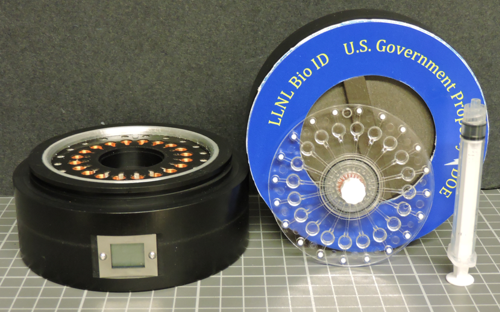Bacterial pathogens cause up to millions of critical infections every year in the United States and around the world. Treatments for these infections have become increasingly ineffective as the bacteria causing the infections have become resistant to common antibiotic medications, causing a dilemma for clinicians as they search for the correct treatment for their patient's infection in a trial-and-error approach. These bacteria can be identified by their nucleic acids, however, detection of these nucleic acids within a sample usually requires expensive lab equipment and time-consuming methods. Moreover, amplifying the detected DNA further adds to the cost, manpower, and time to complete the entire process of detection and amplification. These confounding factors to obtaining nucleic acid amplicons can be detrimental in time sensitive situations or austere environments, such as clinical diagnostics and battlefield point-of-care testing. Thus, a method to expedite and reduce the complexity of detecting and amplifying nucleic acids is necessary to not be a burdensome process in those critical environments.
LLNL scientists have developed a battery-powered device which is low-cost and multi-chambered for the extraction and amplification of nucleic acids from environmental, clinical, and laboratory samples via loop-mediated isothermal amplification (LAMP). This platform identifies pathogenic bacteria and assists in determining the optimal treatment plan. A multi-chamber amplification cartridge in the device includes necessary reagents, a sample collection and transfer unit, and a heating unit which also contains a timer to track reaction start and stop times. The device also has a fluorescence detection component as well which is used with isothermal amplification techniques utilizing colorimetric detection to identify the target pathogen. The heating unit contained within the device maintains a given temperature for up to one hour, ensuring time for the 30-minute amplification process to complete and ensuring accuracy of results.
- Disposable cartridge allows for easy switching for different samples
- Low-cost unit projected to be less than a quarter of the cost of traditional PCR instruments
- Avoids lengthy trial and error treatment routines for common bacterial infections
- Multi-chamber device enables parallel LAMP assays in a low-cost, compact fashion
- Clinical diagnostics and environmental sampling
- Assisting in formulation of patient treatment plan by clinician
- Disposable point-of-care diagnostics and LAMP assays
LLNL current holds a patent 9,795,968 "Multi-chamber nucleic acid amplification and detection device" for this technology (LLNL internal # IL12528) and a pending patent application (LLNL internal # IL-13294).


